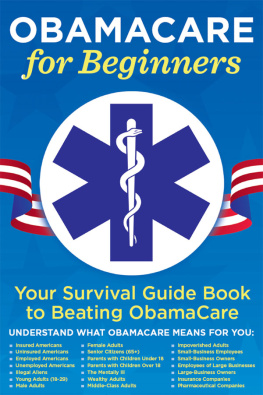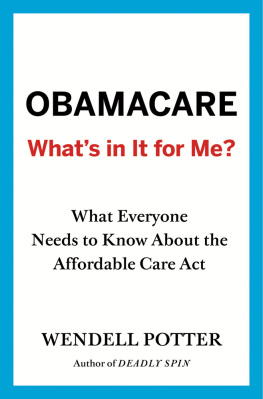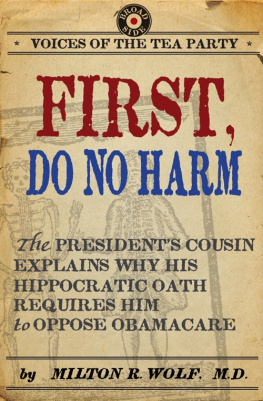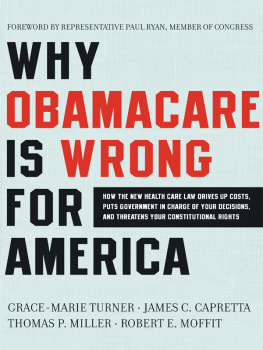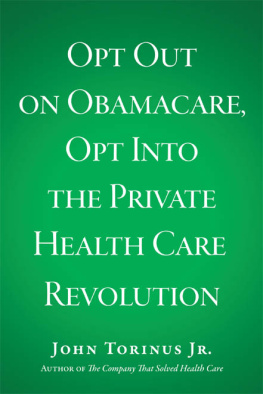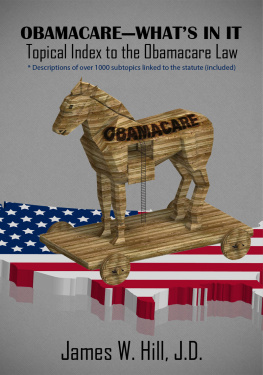Introduction
During the presidential election of 2012, Republican candidate Mitt Romney promised that on day one of his presidency he would repeal Obamacare, the name commonly (and, for a long time, negatively) used to refer to the health care reform bill signed into law by President Obama on March 23, 2010. However, many agree that the Patient Protection and Affordable Care Act (PPACA), aka Obamacare, was largely based on the health care reform act Mr. Romney had signed into law when he was the governor of Massachusetts (20032007). It is little wonder that Obamacare has become such a lightning rod of controversy. In fact, not since President Lyndon Johnson signed the Civil Rights bill in 1968 has there been such turmoil over a piece of legislation in Washington, D.C.
Understanding
Obamacare
WHAT IS OBAMACARE?
Obamacare (a term since embraced by its namesake) is a comprehensive health care overhaul aimed primarily at ensuring that affordable health care is available to all Americans. If individuals (citizens as well as green cardholding legal aliens) wish to opt out, they will pay a tax penalty. The law promises to reduce health care costs, which have skyrocketed over the past decade, and make it possible for the working poor who dont receive medical benefits from their employers to purchase low-cost insurance for themselves and their children. Americans who receive government assistance in the form of ) wont see their benefits change.
Proponents of the bill say that Medicare spending cuts will reduce unnecessary costs (such as those through the Medicare Advantage program and/or to hospitals and private insurance companies), and this money will be used to help pay for Obamacare. Opponents argue that doctors will stop accepting Medicare patients because of low reimbursement rates, hospitals will struggle, and individuals will have their options limited. Medicare Advantage, a major point of contention, lets consumers join an HMO or PPO, with the government reimbursing the organizations for the expenses incurred by the patients. Government payments to Medicare Advantage will be drastically reduced by January 2014.
IMPLEMENTING OBAMACARE
Obamacare is a complex law and few have actually read it in its entiretyincluding some lawmakers who voted for or against itlet alone understand its full ramifications. The law wont be fully implemented until 2020, but there are several milestones along the way. For example, children of insured parents were covered up to age 26 as of September 2010. At the same time, insurers were required to provide free mammograms and colonoscopies to their customers, meaning insured individuals werent responsible for a co-pay for those tests. As of August 2012, insurers were required to provide free preventive care for insured women. By 2014, an individual mandate tax will be enforced, which means that Americans who dont purchase health insurance will pay a penalty of up to $285 per year. That penalty will increase gradually until 2016, when it will reach up to $2,085, depending on income..
A BRIEF HISTORY OF THE HEALTH CARE DEBATE IN THE UNITED STATES
Many industrialized nations offer ) to their citizens. Why, then, does the United States continue to adopt a private and employee-based system? The answer is complex. Some people believe it lies with early U.S. politicians, who feared socialism and considered it an affront to the American way of life (i.e., capitalism). Rather than embrace universal health care as a national good, they preferred to let the free market handle health care for employees. Others believe that powerful lobbies (insurance companies and medical professionals) want to protect their profits and have strongly influenced the debate from the beginning. The roots of these viewpoints can be found in early American history.
Early Twentieth Century
As early as 1911, England passed the National Insurance Act, which covered workers but not their dependents. In 1901, Theodore Roosevelt, a Republican and a Progressive (which, a hundred years ago, werent contradictory), was the first U.S. president to attempt to pass universal health care in the country. This ambitious agenda was met with resistance by others in government and went nowhere. President Franklin D. Roosevelt, a Democrat, also triedand failedon two occasions (1935 and 1939) to pass health care reform bills, but as the country was in the throes of the Great Depression, urgent issues facing Congress took precedence. Despite the New Deal and its overt Progressive agenda, health care reform fell through the cracks. In 1943, the Wagner-Murray-Dingell Bill called for mandatory national health insurance and a payroll tax. The bill was met with opposition from the American Medical Association (AMA), a strong lobby in D.C., and was deemed too socialist for America.
The 40s and 50s
President Harry S. Truman, FDRs successor, also attempted to pass a national health insurance bill, but the Red Scare of the postWorld War II era and the onset of the Cold War again made the proposal suspect of a socialist agenda, and once again the bill met with opposition and died. Truman called for a universal health care reform, affecting all Americans, whereas FDR had attempted to offer health care to the millions of poor, unemployed people. For decades, the idea of a national health care insurance met with resistance from the AMA, which lobbied successfully to block it. Proponents of the plan were unions and a large portion of the population. In 1943, a nationwide Gallup poll recorded 59 percent in favor of the bill.
In 1955, Republican President Dwight D. Eisenhower pled with Congress to pass a national health care bill. Once again, the attempt failed.
The 60s, 70s, and 80s
President John F. Kennedy, whose presidency was cut short when he was assassinated in 1963, was also an advocate of a universal health care plan. Once again, fierce lobbying from the AMA made sure his plan didnt become law, despite public support from senior citizens and labor organizations. Kennedys successor, Lyndon B. Johnson, and his ambitious plan for The Great Society met with the same resistance when he attempted to convince Congress and the American people that too many Americans couldnt afford medical services. However, in 1965 he signed into law Medicare, addressing the needs of retired Americans, and Medicaid, which helps impoverished citizens through state programs subsidized by the federal government.
President Richard Nixon, a Republican and a proponent of health care reform, appealed to Congress to pass a national health care law. One of the most cherished goals of our democracy is to assure every American an equal opportunity to lead a full and productive life, he said in a message to Congress in 1971. His plan was not as comprehensive as his predecessors but met with the same fate. During his presidency, three attempts by Congress to pass a national health care bill never succeeded in becoming law.
President George H. W. Bush, who opposed a universal health care plan, did propose a plan under which Americans could buy into Medicaid, but Congress didnt act on it.
The Clinton Presidency
The first ambitious attempt to pass a universal health care system in the United States came during President Bill Clintons administration, when First Lady Hillary Rodham Clinton spearheaded the Health Security Act of 1993. The comprehensive reform plan for universal health care, which was an enforced mandate for employers to provide coverage through carefully monitored health maintenance organizations (HMOs), was presented to Congress, where it ultimately died, largely because of lobbying by insurance and pharmaceutical companies. Hillary Clintons plan shared similarities with Mitt Romneys Massachusetts plan; however the major differentiator, as he saw it, was state versus federal government control.

